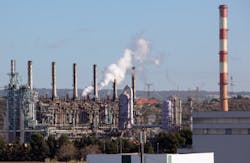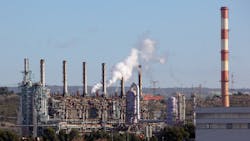Federal investigators at the U.S. Chemical Safety Board (CSB) have presented their preliminary findings regarding last year's fire at the Chevron refinery in Richmond, Calif., which led to a slowdown in operations of the entire facility for months on end, the watchdog has announced in a press release.
According to the CSB team's initial conclusions, the problem was caused by lack of strict supervision, which allowed a badly maintained pipe to burst open, letting fumes leak out and ignite, thus causing the fire. Pipes at the refinery were corroded and their walls had thinned to the extent that ruptures could occur in other sections of the facility, the report found. However, many of these had remained undetected and no safety measures had been implemented, the regulator discovered.
Moreover, the report stated that Chevron had repeatedly failed to apply safer design principles and to upgrade piping in its crude oil processing unit that was extremely corroded. Investigators also recommended that the company should inspect all its U.S. refineries and report lagging safety indicators for its two California plants to the CSB.
The fire, which took place on Aug. 6 last year, luckily caused no fatalities but was a serious threat to employees who were at the scene of the incident and many others at the refinery at the time. More than 15,000 residents at Contra Costa County sought medical help because of difficulties in breathing they experienced after the cloud of toxic fumes from the refinery covered the area.
RELATED: Chevron refinery fire a 'close call'
According to Dr. Rafael Moure-Eraso, chair of the CSB, problems at the Richmond facility were a reflection of the whole U.S. refining industry. He added that future incidents could be prevented through better worker involvement, company transparency and improved public participation. The findings and recommendations by the CSB refer to the accident at the the Bay Area in 2012, but Dr. Moure-Eraso noted that they should apply to all refineries, chemical plants and the industry in general. He also stressed the fact that regulatory agencies should maintain sufficient professional expertise to effectively oversee these highly technical industries in order to prevent chemical accidents.
Meanwhile, Chevron stated that it had already implemented measures to improve safety at its facilities. The company announced that it had altered its hazard analysis process and had enhanced its damage mechanism review for different refinery units. Chevron is committed to cooperating with the CSB and other regulatory agencies towards the common goal of achieving efficient regulation that would enhance the safety and reliability of refinery operations across the industry, Chevron said in a statement. The company, which had been producing transport fuels at about 50 percent of the refinery's capacity since the incident, also claimed that works on repairing the damaged crude distillation unit were completed in March and it was set to restart by the end of April.

